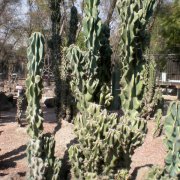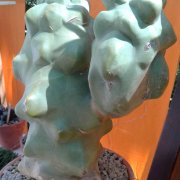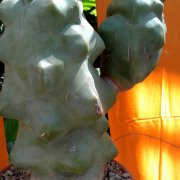Care of the cactus Pachycereus schottii or Senita cactus |
|
The genus Pachycereus, family Cactaceae, includes 10 species of cacti native to Mexico and the southwestern United States. Some species are: Pachycereus schottii, Pachycereus pringlei, Pachycereus marginatus, Pachycereus weberi, Pachycereus pecten-aboriginum. Common names: Senita cactus, Old man cactus, Totem Pole cactus, Whisker Cactus. Scientific synonym: Lophocereus schottii. This species is native to Baja California and Sonora, Mexico. They are large, slow-growing cacti that branch from the base and reach 7 meters (23 feet) in height. They have 5-9 ribs with white and woolly areoles that have 5 radial spines 1 cm (0.39") long and a single central spine; there are monstrous varieties that do not have thorns. The flowers measure 4 cm (1.57") in diameter and can be pink or whitish. They bloom in summer and the flowers open at night. Senita cactus is used in rockeries, on dry and sunny slopes, as isolated specimens and in pots when they are young. It's ideal for frost-free Mediterranean coastal gardens. Pachycereus schottii needs full sun exposure and a hot, dry climate. It does not resist temperatures below 6 ºC (42.8 ºF). The soil must be very well drained, for which you can use a commercial substrate for cacti or a mixture of leaf mulch and coarse siliceous sand in equal parts. Totem Pole cactus is a very drought-resistant cactus that needs occasional watering in spring and summer; in autumn water little and do not water in winter. Pachycereus schottii does not need fertilizer or pruning. Old man cactus is a plant resistant to the usual pests and diseases; it fears excess moisture at the roots and intense cold. Lophocereus schottii is propagated by stem cuttings that are allowed to dry for a few days before planting. |
Images of the cactus Pachycereus schottii or Senita cactus |
Find plants
Pachycereus schottii or Senita cactus | Care and Growing
© 2026 FavThemes


